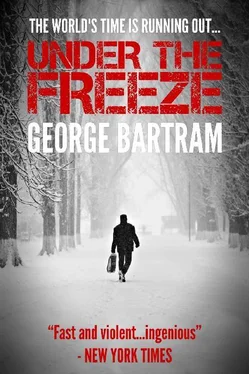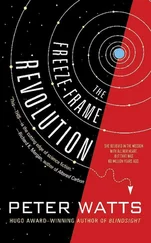Tarp thumped him on the chest. He pressed down with both hands. He thumped again. He looked up. The other boat was slowing twenty yards away. Between them the oil slick spread like a gleaming skin on the smooth water, rippled with crimson from the sunset.
“You got an emergency?” a blond young man called from the waist. He looked like a college boy on a summer job. He was big, Tarp noticed, with a neck like the base of a mast. If he’s Agency , they hired him for that California look . Too much television .
“I got an old man down on his back!”
There was a second man at the wheel. He was shorter and older and had wary eyes. He also had a rifle that he held cradled under his right arm while he steered with his left.
“I’ve been working on him but I haven’t done much good!” Tarp shouted. “He’s breathing. I don’t know. Either of you know any medicine?”
The man at the wheel touched a control and the engine gurgled and his boat swung stern-in toward Scipio . He reversed and began to back slowly toward her through the oil. “Whyn’t you take him into Key West?” he said.
“Engine trouble!”
“What a coincidence.” He throttled it way down and the engine noise dropped to a rough purr. “You must be on a roll.” He looked the Scipio over. It was a bigger and faster boat than his own, and its electronic gear was remarkable for a sportfisherman. “We can give you a tow,” he said grudgingly.
“This old man can die!” Tarp bellowed.
The young blond looked at the older man. There was disagreement there. He knew the dilemma they were in: they had been sent out because of a rumor, and now they were confronted with a complication. A wrong judgment would mean newspaper stories, then internal investigations. It was the sort of dilemma that led to short careers.
“Take him on your boat and you take him to Key West,” Tarp said. “You can’t tow my boat at any speed at all. Take him in and I’ll stay with the boat.”
Their craft came very close and then bumped Scipio’s hull.
“I’ll have a look,” the blond one said. He stood on the gunwale, and Tarp saw that he was wearing a diver’s knife and a .38 on a separate belt at his waist. Feeling young and immortal . A sure way to get killed .
He jumped to the Scipio’s gunwale and then to her deck.
Repin’s shallow breathing was inaudible over the other boat’s engine. His tongue stuck out a little between his flabby lips, and somehow he had managed to look pale. The young man bent over him. “Jeez, he’s in lousy physical shape,” he said. “God, it’s a lesson in how you don’t want to let yourself go, am I right?”
“That’s right.” Tarp looked covertly at the other man. He was holding the rifle loosely in both hands now. “Hey,” Tarp said to the young one, “let me get rid of some of this grease and I’ll help you with the old guy.”
He knelt beside the rag. He picked it up with his right hand, picked up the gun with the left, still concealed by the oily cloth, and fired. There was a cry of rage and pain from the man in the boat and then there was a flurry of action on Scipio’s deck where Repin was lying. Tarp never took his eyes from the man with the rifle, however, moving quickly to his right and raising the .22 to fire again. He had hit what he had aimed at — the man’s left knee — and the shot had made the man spin to the left and go down, but he was a tough man and he had caught himself, and he was trying to force himself erect again so he could bring the rifle to bear.
“Don’t!” Tarp shouted. “I’ll kill you with the next one.” He stood at Scipio’s rail with the Woodsman pointed at the dark man, who slowly put the rifle down and then sank to a sitting position with his left leg stuck out in front of him.
“Mr. Rubin?” Tarp said.
“Well?” Repin’s voice was deep and mocking.
“You okay?”
“What you think, I am beginner like this boy?”
“Get the rifle.”
The dark man was stoic. Blood soaked his pant leg, but he made no sound. He looked at Tarp and then Repin with open hatred, but he wasted none of his energy in words.
Tarp looked down to Scipio’s deck and saw the blond boy lying on his back. He looked peaceful.
“Get yourself over here,” Tarp said to the older one.
“You’re a real sweetheart.”
“It’s a twenty-two, not a cannon. Come on.”
“It’s big enough.”
He dragged himself to his feet and came down his own boat, supporting himself on the rail. Tarp put a line on the other boat and tied the two together, then he hauled them in tight, stern to port side, as the man put his bleeding leg over and then swung his good leg after and carefully slid to a sitting position on Scipio’s deck.
“They sent me a kid for a partner,” he said glumly.
“He learned a lot.”
The dark man squinted at Repin. “KGB?”
“No, he’s a Polish aristocrat. Don’t ask questions.”
The dark man looked at him with an expression that showed both pain and disgust. “They told me you were a tough nut. I told that kid we should shoot you first and then find out who the old man is. I told him we could always make an accident out of it later, but he said I was cynical.” He laughed. Tarp laughed a little. “Now I’m not just cynical, I’m bleeding. Christ, that hurts!”
“I’ve got morphine.” Tarp reached down into the cabin without taking his eyes from the man and felt in the first-aid box. He tossed him the morphine kit. “Strictly do-it-yourself. You got another gun?”
“On my ankle.”
“Don’t get cute with it.”
Repin had taken the pistol and the knife from the blond one; he put the gun in his own belt and threw the knife overboard, and then, when the older man had finished squeezing the morphine syringe, he felt over him, staying out of Tarp’s line of fire. He stood up and backed away a step with a little revolver from the ankle holster and the two wallets from the two men. He tossed the wallets to Tarp. There was Agency identification in each one.
“That’s pretty risky,” Tarp said. “Tough if the Cubans caught you.”
“The Cubans wouldn’t catch me.” The man smiled foggily. The morphine was starting to work. “I was going to throw them the kid as a diversion.”
Tarp went aboard the other boat and killed her engine, then looked her over. She had been leased in Key West and was simply a decent sportfisherman with adequate radar and some fancy listening gear that the two men had put aboard. Next to the radar was a black box the size of a toaster, and Tarp knew it was the device that identified them with a friendly signal on properly equipped radars. It was on now, a red light gleaming like a bean-sized eye against the blue-black sky. All the friendlies would know that the boat was sitting here with Scipio .
Tarp went back to his own boat and removed the engine starter and threw it overboard. He took the shotgun and the rifle, then slid open the bulkhead compartment at the rear of the lockers and took out the AR-15 and the clips that were hidden there. He put the weapons on the other boat, then went back into Scipio’s cabin and removed his computer-signal scrambler and dropped it overboard; then he went down again and rummaged under his bunk and found a waterproof packet that looked like an electronic tool kit but wasn’t.
Inside the pockets of the packet was money in three currencies and a set of identification — passport, driver’s license, credit card, as well as three “details”: a reader’s card for the Bibliothèque National in Paris; a member’s card for the Paris Jockey Club; and a journalist’s pass issued by Agence - Presse Europa , all in the name of Jean-Louis Selous. The Selous identity was a deeply established one that was expensive for him to keep up; it was supported by a listing in the Paris telephone directory and two professional organizations, and by five articles that had appeared over the Selous byline in European magazines, paid for by Tarp and written by some rather high-priced talent. Tarp folded the packet and put it in a rear pocket and buttoned it down, then he looked over the cabin and decided there was nothing more that had to be taken, and he went up to the deck.
Читать дальше












